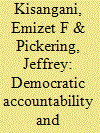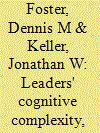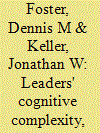|
|
|
Sort Order |
|
|
|
Items / Page
|
|
|
|
|
|
|
| Srl | Item |
| 1 |
ID:
109937


|
|
|
|
|
| Publication |
2011.
|
| Summary/Abstract |
Agreement on which democratic regime types are prone to use diversionary force has yet to materialize in the embryonic empirical literature on the subject. Nor has consensus emerged on the theoretical approach that best explains the diversionary tendencies of different democratic political systems. By separating out benevolent and belligerent diversionary military missions, we begin to offer some clarity to this mixed empirical literature. In zero-inflated Poisson estimates of fifty-six democracies from 1950 to 2004, we find compelling evidence that a theoretical framework emphasizing leader accountability best explains democratic diversionary behavior. More accountable democratic executives (leaders of majoritarian, weak-party majority, and minority governments) appear significantly more likely to use diversionary force than counterparts with less accountability (especially in coalition governments). Democratic leaders also seem to use benevolent military force for diversionary purposes more often than belligerent force, though they still use the latter in specific contexts.
|
|
|
|
|
|
|
|
|
|
|
|
|
|
|
|
| 2 |
ID:
133584


|
|
|
|
|
| Publication |
2014.
|
| Summary/Abstract |
Some scholars have suggested that when faced with domestic political problems, leaders employ simplified decision processes, preferring action to deliberation and highly visible diversionary uses of force to alternative policies. Others contend that domestically embattled leaders will pursue a more rational examination of the costs and benefits of various options-the sort of deliberation that will lead them to reject diversionary force in favor of less risky measures. Drawing on research in political psychology, we argue that leaders' cognitive processes are not constants but variables, and that both models are correct under certain circumstances. Leaders low in conceptual complexity (CC), and especially those with hawkish leanings, will pursue simplified decision-making procedures and embrace diversionary strategies, while leaders who are high in complexity will pursue a more thorough consideration of risks and alternatives and generally avoid diversionary actions. We examine these expectations by testing the interactive effect of economic misery and leaders' CC on American force usage for the period 1953-2000. The findings indicate that more conceptually simple leaders-particularly when high in distrust, a trait linked to more hawkish policy inclinations-are significantly more likely to engage in diversion.
|
|
|
|
|
|
|
|
|
|
|
|
|
|
|
|
| 3 |
ID:
133583


|
|
|
|
|
| Summary/Abstract |
Some scholars have suggested that when faced with domestic political problems, leaders employ simplified decision processes, preferring action to deliberation and highly visible diversionary uses of force to alternative policies. Others contend that domestically embattled leaders will pursue a more rational examination of the costs and benefits of various options-the sort of deliberation that will lead them to reject diversionary force in favor of less risky measures. Drawing on research in political psychology, we argue that leaders' cognitive processes are not constants but variables, and that both models are correct under certain circumstances. Leaders low in conceptual complexity (CC), and especially those with hawkish leanings, will pursue simplified decision-making procedures and embrace diversionary strategies, while leaders who are high in complexity will pursue a more thorough consideration of risks and alternatives and generally avoid diversionary actions. We examine these expectations by testing the interactive effect of economic misery and leaders' CC on American force usage for the period 1953-2000. The findings indicate that more conceptually simple leaders-particularly when high in distrust, a trait linked to more hawkish policy inclinations-are significantly more likely to engage in diversion.
|
|
|
|
|
|
|
|
|
|
|
|
|
|
|
|
|
|
|
|
|